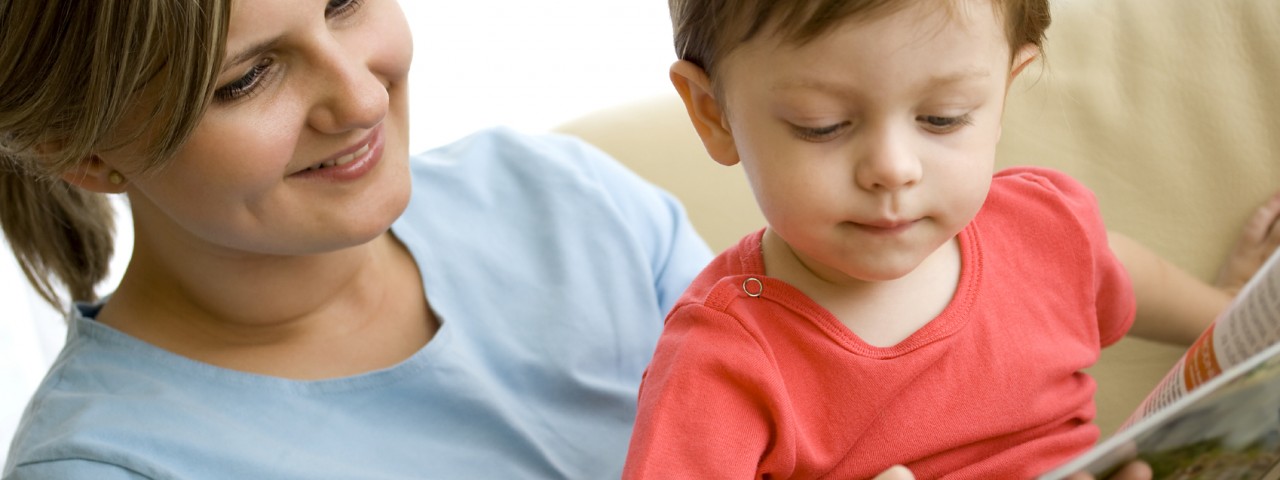The Development of Early Language and Self-Control In Preparing Children for Kindergarten
- Tweet

Early brain development establishes the foundation for kindergarten readiness, across both thinking and social and emotional skills. This month, we examine two important dimensions of readiness. These include language and literacy development, on the one hand, and the emergence of a child's self-control, on the other hand. While we generally associate the development of reading and communications skills with school readiness, we tend to hear much less about the importance of a child's ability to regulate their own behavior.
Language and Literacy Skills
Children are trying to communicate long before they learn how to form words. The process of learning how to speak, developing a vocabulary, and learning about the give-and-take of communication all takes place in the context of a child's environment. Communication develops in a child's environment of relationships with their parents, family and caregivers from birth onward.1 These language and literacy skills, in turn, become vital tools for learning and for interacting with peers, teachers, and parents. As very young children begin to learn to communicate their wants and needs, they may grow frustrated quickly. With their parents' loving encouragement, their confidence in their ability to express themselves will grow, so that by the time they reach kindergarten, they should be able to communicate confidently through words.
Children who are excited about kindergarten will be interested in reading and learning — they'll often demonstrate their ability to "pretend-read" a book by looking at the illustrations. Parents help to develop a love of literacy in their children by making books, magazines, crayons, and pencils available. Encouraging a child to look at words on a page, study pictures in a book, and hold a marker to draw, helps to expand her developing language and literacy skills.
Self-control
In learning to express themselves through words, young children are also learning to peacefully negotiate conflict and navigate the world of other children and grown-ups. Kindergarten marks a transition from relatively unstructured atmosphere of pre-school to a formal school environment that requires the use of self-regulation and control. Self-regulatory skills include listening, following directions, cooperating with peers and teachers, and sitting still for reasonable periods of time. During the first years of life, a child begins to learn how to manage his feelings and emotions, with help from parents and caretakers. The ability to self-regulate is is linked to feelings of social competence, well-being, and self-confidence.2 In addition, children who develop the cognitive skills needed for self-regulation also show stronger focusing skills,3 peer competence, and control of positive and negative feelings.4 Children with well-developed self-control skills generally do better in kindergarten, and later in school.5
Families support the development of self-control among pre-schoolers by establishing comfortable routines at home that allow for play time, quiet reading time, meal times, and regular bedtimes.
References:Lock, A. (2004). Preverbal communication. In G. Bremner, & A. Fogel (Eds.), Blackwell Handbook of Infant Development (p. 379-403). Malden, MA: Blackwell Publishing, Ltd.
Thompson, R. A. (2002). The Roots of School Readiness in Social and Emotional Development. The Ewing Marion Kauffman Foundation: Kansas City, MO.
Blair, C., & Razza, R. P. (2007). Relating effortful control, executive function, and false belief understanding to emerging math and literacy ability in kindergarten. Child Development, 78, 647-663.
Trentacosta, C. J., & Izard, C. E. (2007). Kindergarten children’s emotion competence as a predictor of their academic competence in first grade. Emotion, 7, 77-88.
Matthews, J. S., & Morrison, F. J. (2009). A structured observation of behavioral self-regulation and its contribution to kindergarten readiness. Developmental Psychology, 45(3), 605-619.
